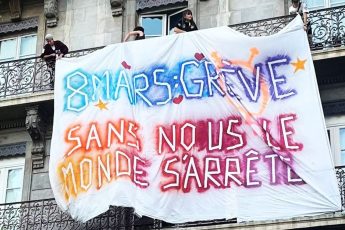
Interview to JN by TSS PLATFORM
For the series of interviews towards the global feminist strike of March 8th and 9th, we interviewed JN, a woman textile worker from Turkey (read here the first interview to Nina from Bulgaria). JN struggles every day against a situation that exposes her not only to exploitation, but also to the absence of any kind of social protection. While women are under the constant risk of harassment and need to defend themselves against patriarchal violence with whatever they have at hand, the government exerts an oppressing control over any form of dissent, producing fear and a sense of impotence. To the top of it all the Turkish government makes the citizens pay the price of the war in Syria and the economic crisis by increasing taxes and prices and by imposing austerity measures. Only a few days ago the government, fearing protests and demonstrations against the war in Syria, has again blocked the access to social media, while the police carry out arbitrary checks everywhere. However, also thanks to her daughter who is refusing the general sense of powerlessness that everything seems to create, JN has decided that this year she will join the global women’s strike on the 8th of March.
TSS: What do you do for a living? How have your working and living conditions changed in the last years?
JN: I work as a textile worker without insurance. I get a salary of 500 TL (72€) per week, that is, below the monthly minimum wage. 6,384 TL (920€) is the hunger limit in Turkey, while I get one third of it. I had a bag shop, but because of the economic crisis, I went bankrupt and my debts in the banks grew, Besides the rent prices of the shop, the Turkish state takes extra money under the name of “withholding tax”. While operating my shop, the withholding and rental costs were quite expensive monthly. In addition, I had to pay 750 TL (108€) monthly to be insured while running my shop (healthcare allowance). Since I could not pay these, besides my debts in the bank, I have 11.000 TL (1500€) Bağkur debt right now (Bağkur is a social security provider for autonomous workers). Unfortunately, after 18 months as an operator, I went bankrupt. I had to work because I had to live, and after bankruptcy, I changed many “unskilled” jobs. I was fired because I was new to many workplaces. I lost my husband 7 years ago, I get a widow pension of 1240 TL (180€). My husband served this state for 15 years as an insured worker. The price of this is apparently 1240 TL (180€). Now, my salary in the textile sector, which is below the minimum wage, is not enough to live. I can pay neither my rent nor my bills. Besides, I also have bank debts. Also, I couldn’t pay my bills this month with a 70% increase in natural gas, electricity and water costs.
TSS: Does being a woman affect how you are treated at work? How?
Of course, it was not easy to change a lot of jobs as a woman and “unskilled” employee. Since I am new to the textile sector I am currently in, I am getting 200 TL (28€) less monthly salary than others. Since I was new to the industry, I was subjected to various humiliations at first. For example, “You are 42 years old, will we teach you this work at this age?” etc…
TSS: Have you ever witnessed or experienced any kind of sexual harassment, for instance in your workplace or even in your family or in the street?
There was a woman. She was 6 months pregnant; she was abused by a man at the market. So I attacked him with a needle as self-defense.
TSS: Have you participated in any struggle recently, for instance concerning some specific policy enacted by your government or in your workplace? What were the results? Which obstacles and limits did you face?
JN: No, I did not participate. Because I know the consequences of such an action in Turkey. We, as citizens, experience the consequences of induced powerlessness.
TSS: Have you ever heard about the struggles that women are organizing all around the world to fight against male violence, cuts on welfare, limitations and ban of abortion? Do you know that in many places in the world they organized a women’s strike in order to demonstrate their role and force within society and to claim for an end to men’s violence?
JN: Yes, I know it. The answer I gave in the previous question, I mentioned the induced powerlessness. My daughter is a young woman who rejects this powerlessness. Since I occasionally talk with her and her friends, I am aware of the women’s strike and I will join the women’s strike on March 8th.
TSS: If you could strike, what would you strike against? And how?
JN: I would like to strike for the right to have an abortion by saying that my body is my decision.
TSS: What would you say to all those women around the world who daily face your same problems in the workplaces, at home and in society?
JN: I would like to say that we have to learn to live together humanly, fight for our rights and learn to live in common despite all our separations (language, religion, etc.).





